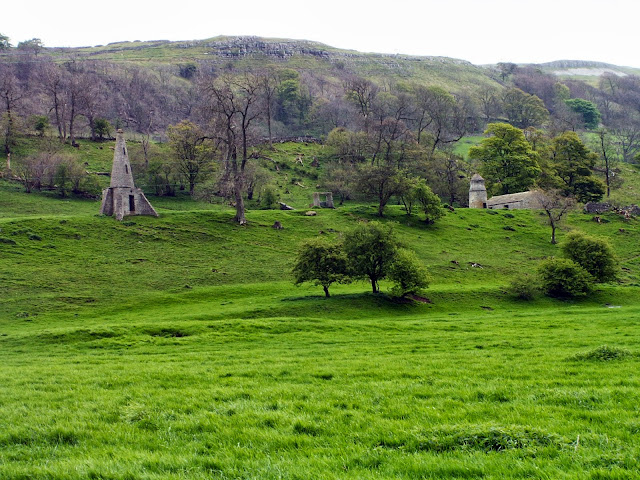McCaig’s Tower
In 1897, John
Stuart McCaig, an Oban banker and art critic, wanted to give work to the local
unemployed men and at the same time to build a lasting memorial to
himself. The result was the construction
of a large granite replica of Rome’s Colosseum, still to be seen dominating a
hill which overlooks the town of Oban on Scotland’s west coast. His grandiose scheme kept local stonemasons
and labourers in work which continued until his death. Wonderful views over the town, harbour and
islands are to be seen from a viewing platform near the folly.
McCaig's Tower
Church Folly
If you drive through Tattingstone in Suffolk and alongside
Alton Water, you will see what appears to be an old church complete with tower,
by the roadside. Closer inspection will
reveal that it is not a church at all but three cottages disguised as a church! This fine folly was built in 1760 by the
local Squire, Edward White M.P. He had a
good view of his ‘old church’ from his fine house on the other side of the
valley.
Bottle Lodge
Just outside the village of Tixall in Staffordshire and not far from Tixhall Gatehouse, is a tiny octagonal building with an ogee roof.
known as Bottle Lodge. The building
mirrors the corner towers of the nearby gatehouse – possibly the gatehouse to
the gatehouse. It has been completely
renovated and is now a minute house.
Bottle Lodge
Mow Cop Castle
On the Staffordshire – Cheshire border near Biddulph, a hill
rises to nearly 1100 feet above sea level and it is crowned by Mow Cop Castle,
which is not really a castle! This
Gothic folly in the shape of a ruined castle was erected in 1750 to gratify the
whim of local landowner, Randle Wilbraham.
This curious building is now in the care of the National Trust, and
spectacular views can be had from the site.
Mow Cop Castle
Aysgarth Follies
Sorrelsykes
Farm at Aysgarth in North Yorkshire is built in a variety of styles and has the frontage of an 18th
century Palladian mansion dating to C 1750.
There are some curious ‘eyecatcher’ follies in the grounds such as a sham ruin and
an elaborate arched gateway. The ‘Rocket Ship’ c1860 and the ‘Pepper Pot’ c1921 make up the collection.
Stately farms
The eccentric eleventh Duke of
Norfolk was the owner of Greystoke Castle in Cumberland in the 18th
century. He was a Whig and a strong
supporter of the American colonists which prompted him to build two curious
farm houses on his estate to commemorate two of the battles in the American War
of Independence. Both of the farms are
surrounded by curtain walls with thin towers and blank arches – ‘Fort Putnam’
also has circular buttresses, whilst ‘Bunkers Hill’ has a crenellated roof and
arched windows. Both farms are situated
alongside the B5288 to the east of Greystoke.
The Duke also built a third farm house – ‘ Spire Farm’, near to the
other two, also castle like but with a
fine spire on the central tower, reminiscent of a church tower. It is said that the tenant of this farm
belonged to an obscure religious sect and the Duke designed the building with
this in mind.
'Bunker's Hill'
 |
Spire Farm |









No comments:
Post a Comment